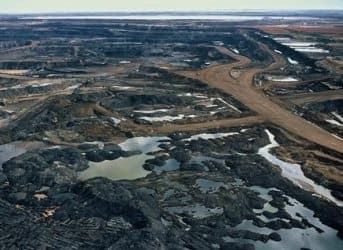Canada's natural resources minister told delegates at the International Energy Forum in Kuwait that his country was on the cusp of becoming an "energy superpower." Canada ranks No. 6 in terms of global oil production, but much of its crude exists in the form of oil sands. European leaders are considering a measure that would classify oil sands as an environmental issue, prompting Canada to threaten to take the issue to the World Trade Organization. With the U.S. political system in a deadlock over Canadian crude, the Ottawa government is now working to convince the international community that the global market is in jeopardy if polices "discriminate against oil sands."
Drill-happy critics of the Obama administration are painting the Keystone XL oil pipeline planned from Alberta as a panacea to U.S. economic woes. Because of debates over the planned route through Nebraska, however, the White House has pushed the issue aside for now. The pipeline company behind the project, TransCanada, has opted for a smaller leg in the United States while the Canadian government has thrown its support behind the Northern Gateway pipeline meant for Asian exports.
Canadian Natural Resources Minister Joe Oliver said his presence at the IEF summit in Kuwait proved his country was "an emerging energy superpower." Canada has around 175 billion barrels of proven oil reserves, which means it’s the only non-OPEC member in the global top five, just behind Saudi Arabia and Venezuela.
European leaders in March were unable to reach a decision on whether or not to characterize oil sands as an environmental issue. Critics of oil sands note that its production releases much more CO2 into the atmosphere compared with regular crude oil and its tendency to sink in water makes it a particular concern if spilled. Some critics have dubbed it the dirtiest form of oil on earth and advocate an outright ban. The European government is set to consider the issue by June.
Oliver, however, complained to IEF delegates that any policy that would discriminate against oil sands would be harmful to the global market and overall energy security. Last year, the global economy was threatened by a loss of crude oil from war-torn Libya, OPEC's No. 7, so sidelining oil sands from Canada could be much more severe.
"Our government believes that the free market is the most efficient and cost-effective means to ensure the proper allocation of resources for the development and supply of energy," said Oliver.
Just as Obama said there's no "silver bullet" that can magically push U.S. gasoline prices to something American consumers consider fair, there's nothing in a global market that's easily replaced. Singling out Canadian oil means potentially sidelining an oil supply larger than Iran's, something a depressed European economy could hardly stomach. But as with Iranian crude, if the Europeans don't want it, they don't have to buy it. While that's an oversimplification of the issue, the world still needs as much oil as it can get. Europe is embracing a greener economy. But until global economic engines run on something other than petroleum products, when Canadian crude oil is at stake, it's time to just let it flow.
By. Daniel J. Graeber of Oilprice.com



















Thanks
As it stands, the oil companies have been cutting corners on their environmental assessments, and have been constantly green-washing to make themselves look good. Add to that, a recent study shows that their so-called world class reclamations may never return to anything resembling a natural state, and we've got a problem. The Canadian government has been no better, essentially approving every proposed project without giving it due diligence.
If I felt that either the oil companies or the Harper Government actually cared about anything other than their bottom line, I may feel differently about the oil sands. There is a long way to go until we get to that point.
Should the debate end? No way. This debate is the only thing encouraging some sort of environmental responsibility in Alberta, because the Canadian government has shown it couldn't care less.
If you like facts, here is a good one: emissions intensity is currently trending upwards in the oilsands. 2010 saw a rise of 2% in emissions intensity.
http://www.rce2010.ca/oil-sands/air/greenhouse-gases/
Even within the oilsands, there is such a thing as low-hanging fruit. In this case it is the mine-able oil sands. Now that they are increasingly using in-situ techniques, watch emissions intensity continue to rise.
If you would provide a link for your "fact" that "in the last decade, on average, a 30% reduction has been achieved", I would welcome it, because according to the report above, that 30% reduction has come since 1990 - significantly longer than a decade. 1990 was also the early stages of oilsands development, so rapid operational improvements can be expected as operations are scaled up.
The fact of the matter is that oilsands emit more than other sources of oil. It is also true that environmental assessments have been inadequate, leading to public outcry and a complete re-vamping of the assessment program. If the oil companies want the debate about their product to end, they need to improve their performance.
Lets remind ourselves that even in our Country we import alot of foreign oil were as we should be looking at moving our oil down East to refine rather than impoting it from other countries.Build a few pipelines going east more refineries and forget about going south with the raw material and sell them the finished grade.Doing this would increase jobs that would give a good living to alot of Canadians both out west and east.